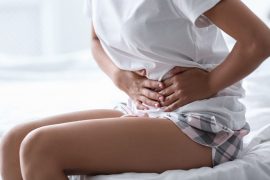Menopause which is also known as climacteric is a normal health condition that all women experience when they get to a certain age, although the ages differ.
The term “menopause” can describe any of the changes a woman goes through either just before or after she stops menstruating, marking the end of her reproductive period. At this time, menstrual flow stops completely and the woman is unable to bear children.
Menopause typically occurs between 49 and 52 years of age.
What Causes Menopause?
Every woman is born with a finite number of eggs, which are stored in the ovaries. The ovaries also produce the hormones estrogen and progesterone, which is responsible for the monthly menstruation and ovulation. Menopause happens when the ovaries stop releasing eggs monthly in form of blood (menstruation).
Menopause is said to be normal when it occurs after the age of 40 but abnormal when it happens before age 40. Early menopause can occur either as a result of surgery, such as hysterectomy, or damage to the ovaries due to chemotherapy. Menopause that happens before 40, regardless of the cause, is called premature menopause.
How Does Natural Menopause Happen?
Natural menopause is not caused by any type of medical or surgical procedure. It happens naturally and gradually in 3 stages. These stages are:
- Perimenopause Stage: This stage happens several years before menopause. At this stage, the ovaries produce less estrogen. Perimenopause lasts up until menopause, the point when the ovaries stop releasing eggs. In the last 1 to 2 years of perimenopause, the drop in estrogen quickens. At this stage, many women have menopause symptoms.
- Menopause Stage: This is the stage a woman has stopped seeing her menstrual cycle; the ovary has stopped releasing eggs and making most of their estrogen.
- Postmenopause Stage: this stage begins after menopause. During this stage, menopausal symptoms such as hot flashes occur. A Hot flash is a feeling of intense warmth that spreads over the upper body, often with blushing and some sweating- ease for most women. But health risks related to the loss of estrogen rise as the woman ages.
Causes of Premature Menopause
Premature menopause can be genetic, caused by autoimmune disorders, or medical procedures. Other conditions that may cause early menopause include:
- Premature ovarian failure: Normally, the ovaries make both estrogen and progesterone. Changes in the levels of these two hormones happen when the ovaries, for unknown reasons, prematurely stop releasing eggs. When this happens before the age of 40, it’s called premature ovarian failure. Unlike premature menopause, premature ovarian failure is not always permanent.
- Induced menopause: “Induced” menopause happens when the ovaries are surgically removed for medical reasons, such as uterine cancer or endometriosis. Induced menopause can also result from damage to the ovaries caused by radiation or chemotherapy.
Symptoms
Most women experience hot flashes varying from mild to severe when approaching menopause.
Other common symptoms of menopause include:
- Irregular or skipped periods
- Insomnia
- Mood swings
- Fatigue
- Depression
- Irritability
- Racing heart
- Headaches
- Joint and muscle aches and pains
- Changes in libido (sex drive)
- Vaginal dryness
- Bladder control problems
Not all women get all of these symptoms
Menopause Diagnosis
You can either suspect that you are about to approach menopause or go to your doctor for an examination. It also helps if you keep track of your periods and chart them as they become irregular. Your menstrual pattern will be an added clue to your doctor about whether you’re premenopausal.
What Long-Term Health Problems Are Tied to Menopause?
The loss of estrogen linked with menopause has been tied to a number of health problems that become more common as women age.
After menopause, women are more likely to have:
- Osteoporosis (bone disease)
- Heart disease
- A poorly working bladder and bowel
- Greater risk of Alzheimer’s disease(memory loss)
- Poor skin elasticity (increased wrinkling)
- Poor muscle power and tone
- Some weakening in vision, such as from cataracts (clouding of the lens of the eye) and macular degeneration (breakdown of the tiny spot in the center of the retina that is the center of vision)
A number of treatments can help lower risks that are linked with these conditions.




